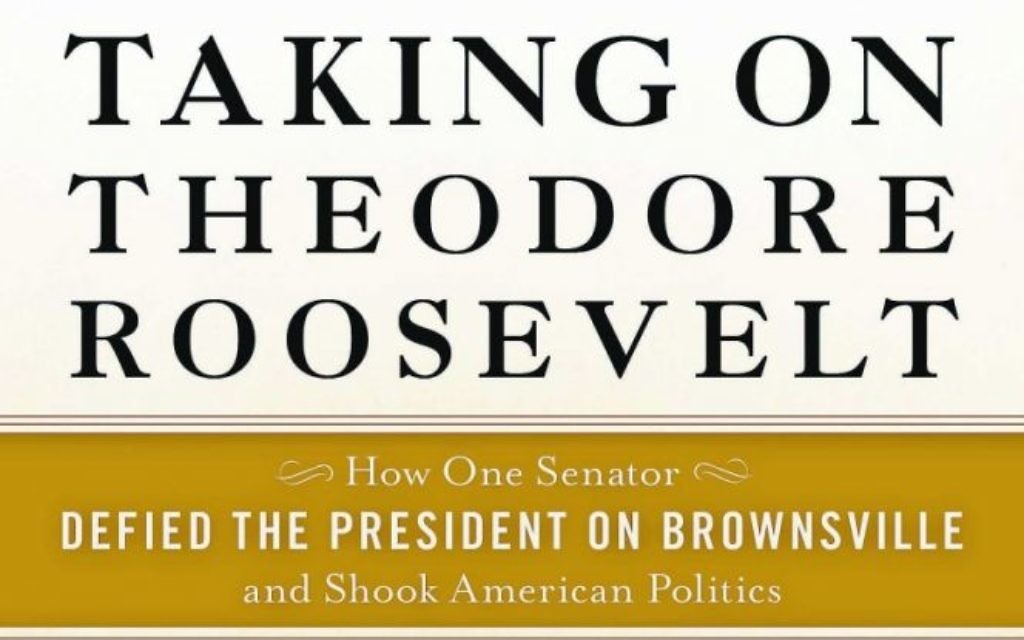Bookfest: Teddy’s Bear of an Error
Atlantan Harry Lembeck is big admirer of Theodore Roosevelt, to the point of serving as vice president of the Theodore Roosevelt Association, so the retired lawyer isn’t the person you’d expect to write a book on one of the Mount Rushmore president’s biggest mistakes.

“I felt like I was being called as a witness for the prosecution almost against my father,” Lembeck said in an interview about his appearance at the Book Festival of the Marcus Jewish Community Center, where he and fellow Atlanta historian Robert Weintraub will share a program Nov. 19. But when Roosevelt made a mistake, “he made a great mistake.”
The case on trial is the Brownsville incident. Just before midnight Aug. 13, 1906, gunfire erupted in the Rio Grande town of Brownsville, Texas, near Fort Brown, starting in Cowen Alley, named for a Jewish family who lived close to the fort and had a party that night.
Get The AJT Newsletter by email and never miss our top stories Free Sign Up
The father was out getting more beer, but the rest of the family and some of their guests dived under tables when the shooting started. No one was hurt at the Cowen house. But one man was killed in town, and another was wounded.
There was a wide belief that the culprits were black soldiers from Fort Brown, but it wasn’t clear which ones or how many. The members of the Black Battalion refused to talk, so three months after the shooting, Roosevelt discharged the entire battalion “without honor.”
Roosevelt’s first mistake was kicking the whole unit out of the Army without a trial in a case confusing enough that even a grand jury in Texas in 1906 never indicted anyone, Lembeck said. The president insisted he didn’t punish them: No one served jail time or lost rank or pay, and the discharge without honor was not the same as a dishonorable discharge.
“But you have to try them,” Lembeck said. “You can’t just say they’re guilty. That’s why people were so angry.”
That denial of a trial was Roosevelt’s first mistake, Lembeck said. The second was doubling down on the decision and trying to destroy anyone who challenged him.
No one challenged him more than a fellow Republican who was a senator from North Dakota, Joseph Foraker.
Foraker (whose name for the moment is on an Alaska mountain near what was Mount McKinley but has reverted to Denali) had no connection to the Black Battalion and initially believed the soldiers were guilty, but he was willing to sacrifice his political career for due process.
“Foraker turns out to be the hero,” Lembeck said. He was a Civil War veteran who never got over what he saw of black suffering in the South and as a result had a passion for racial equality and racial justice.
The senator did come to believe that the soldiers were innocent, but his quixotic quest on their behalf began before that. (A twist is that Lembeck turned up evidence that at least one of the soldiers eventually admitted everything.)
A racially tinged story of injustice remains relevant in modern America and carries echoes of the history of American lynchings and European pogroms. Lembeck said that when Jewish people urged Roosevelt to respond in some way to Russia’s anti-Jewish pogroms, the president pointed to lynchings in the South as a similar but more immediate, closer-to-home problem.
The Brownsville case also is important because it marked a shift in black activism, Lembeck said. Booker T. Washington had set a tone of accommodation and acceptance for blacks as they gradually earned their rights, but rival W.E.B. Du Bois rejected anything other than immediate full rights.
Du Bois gained ascendance after Brownsville, Lembeck said, and his confrontational approach took the black community on the path to Martin Luther King and the civil rights movement.






comments